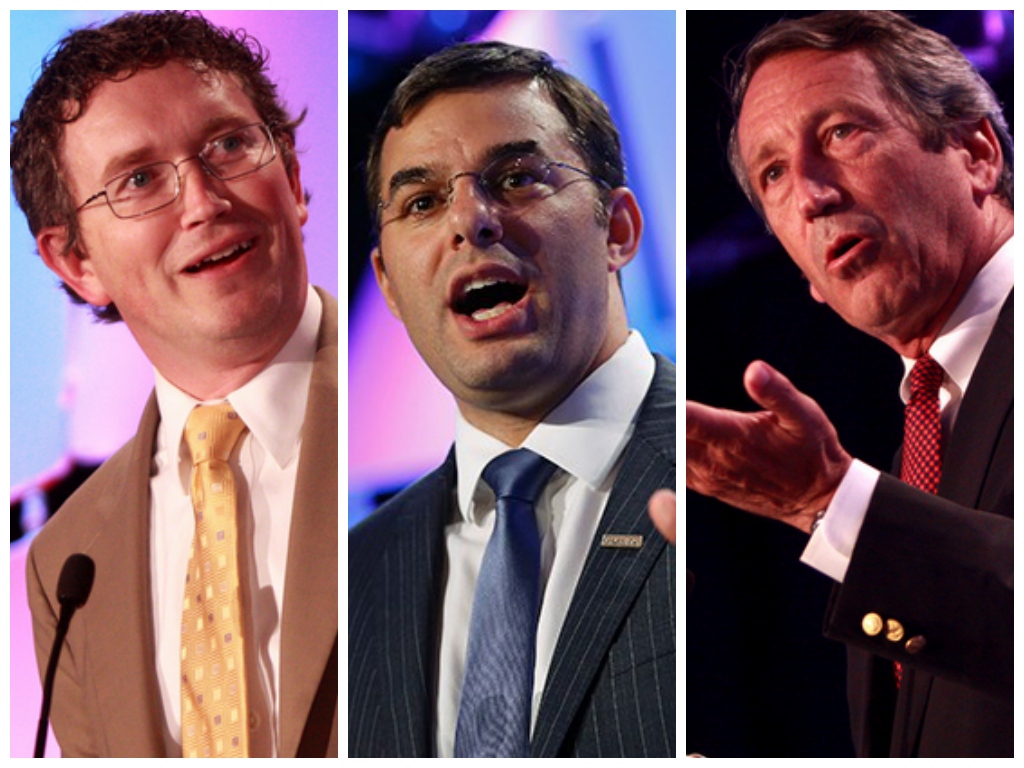Reps. Thomas Massie (R-Ky.), Justin Amash (R.-Mich.) and Mark Sanford (R.-S.C.)
Videos by Rare
The three most libertarian members of the House want nothing to do with the so-called “USA Freedom Act.”
After Rep. Justin Amash (R-Mi.) tore into the bill he had worked on for over a year Thursday, Reps. Mark Sanford (R-S.C.) and Thomas Massie (R-Ky.) joined him in denouncing it as a sham.
The USA Freedom Act was originally designed to rein in government data collecting practices, but last-minute changes substantially watered down the legislation.
Justin Amash spokesman: The USA Freedom Act is a sham
“Today was the first time since returning to Congress I voted against a bill I co-sponsored – the USA Freedom Act. In fact, so did 78 out of the 151 other co-sponsors, which is something you don’t see all that often,” Sanford wrote on his website.
“The problem here is that what started as a strong bill with any number of good ideas for reforming the National Security Agency was changed dramatically right before voting, so that it looks almost nothing like the bill we co-sponsored.”
“[T]his weaker version came to the floor under a closed rule, meaning no one could submit any amendments to change the bill. For example, I introduced an NSA reform bill that would have improved internal oversight at the agency, and was planning on introducing that as an amendment,” Sanford added.
“Under this closed rule, we weren’t even given an opportunity to have these amendments considered, much less voted on.”
Thomas Massie made similar comments on his Facebook page.
The #USAFreedomAct that is on the floor today is not the bill we and 152 members co-sponsored, nor is it the bill that was a watered-down compromise reported by the Judiciary Committee. It is the result of non-transparent backroom dealings.
Under the finalized floor version of the USA Freedom Act, it would be completely legal for the NSA to request all records for an area code, zip code, or even all of the emails for accounts that start with the letter ‘A,’ all without a warrant.
This is why civil liberties groups such as the Amnesty International, EFF, CDT, and Open Technology Institute have all withdrawn their support; it is why companies like Facebook, Google, Apple, Twitter, LinkedIn, and Yahoo have pulled their support.
Together we offered five amendments during markup, two amendments to the NDAA, and nine amendments to the USA Freedom act in an attempt to restore Americans’ right to privacy.
None of these amendments were given an opportunity for debate or a vote on the House floor. The speed by which this bill is coming up for a vote should give all of us pause. Once again Congress risks promoting mass surveillance rather than stopping it.
The only thing the USA Freedom Act prevents the government from doing is demanding that a phone company, for instance, hand over all of its data in real time. But “bulk collection” can still occur if a “specific selection term” — “a term used to uniquely describe a person, entity, or account” — is used in a request. For more on that click here.
Amash’s Chief of Staff, Will Adams, told Rare on Thursday that “the government can go to AT&T and say hand over all of your phone records from any broad set of data,” that there are “no new limits on collection programs” and that the USA Freedom Act is “a sham.”
The USA Freedom Act passed the House on a vote of 303-121.



